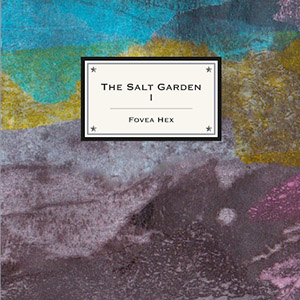Fovea Hex, "The Salt Garden I"
 Clodagh Simonds has had a lengthy and storied career, working with the likes of Mike Oldfield and her own 1970s band Mellow Candle, and her return after a lengthy break with Fovea Hex beginning in 2005. With the rest of the band, including such recognizable artists Michael Begg, Colin Potter, Laura Sheeran. Cora Venus Lunny, and Kate Ellis, and special guests Justin Grounds and Brian Eno, this EP is a captivating, achingly stunning suite of music that defies any sort of classification.
Clodagh Simonds has had a lengthy and storied career, working with the likes of Mike Oldfield and her own 1970s band Mellow Candle, and her return after a lengthy break with Fovea Hex beginning in 2005. With the rest of the band, including such recognizable artists Michael Begg, Colin Potter, Laura Sheeran. Cora Venus Lunny, and Kate Ellis, and special guests Justin Grounds and Brian Eno, this EP is a captivating, achingly stunning suite of music that defies any sort of classification.
The Salt Garden I is the first in a series of three planned 10" EPs of new material and released by the odd combination of living prog legend Steven Wilson's Headphone Dust imprint and the venerable, experimental label Die Stadt.This alone is telling of the wide reaching style and appreciation to be had for Simonds and crew's unparalleled work.One of the defining characteristics of The Salt Garden I is a sense of timelessness.More specifically, a sense of music that simultaneously resembles medieval balladry as much as futuristic electronic composition."The Golden Sun Rises Upon the World Again", for example, showcases vocals that could be from the middle ages, but paired with a tasteful accompaniment of electronic instrumentation.With some elegant vocal processing and effects, the piece builds beautifully.
Sparse, clean arrangements are to be had throughout, even though the songs themselves have substantially different feels and moods to them.Gentle synthesizer passages and slightly dissonant percussive elements balance the light and dark moods amazingly on "No Bright Avenue".At the same time, dramatic symphonic flourishes and tasteful string arrangements meld with Simonds' beautiful, yet strong vocals, resulting in a song that draws from both the big and the small.
On "The Undone Mother," the group emphasizes the electronic elements of their sound more, with synthesizers and other electronic passages swelling up to take center stage before retreating, allow the instruments and vocals to breathe even more, maximizing their impact.With Simonds' voice multitracked subtly, the result is a nuanced, yet tastefully understated piece of music.
The final piece, "Solace," is aptly titled.An instrumental work, the full Fovea Hex ensemble creates a piece that links beautifully melded passages of electronics and stringed instrumentation.With lengthy segments of silence weaved into the more commanding musically oriented passages, it is an amazingly peaceful, yet still powerful piece of music that builds in volume and dynamics as it goes on.
The Salt Garden I continues Fovea Hex's expanding tradition of music that defies categorization or even the more rigid annals of time.With a sound that could be just as easily from the past or the future, and lead by Clodagh Simonds' gentle but commanding vocal presence, the record's only down side is that it just feels all too short.And while the promise of two future installments attenuates this feeling somewhat, I think they need to come sooner rather than later.
samples:
 



